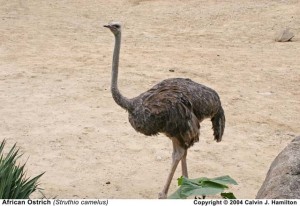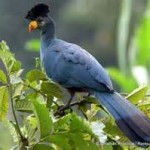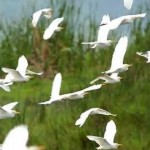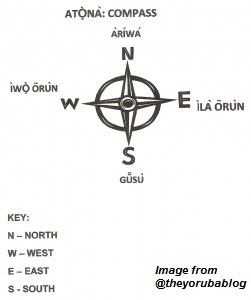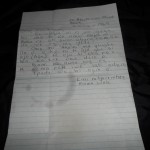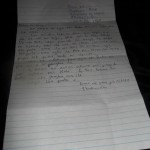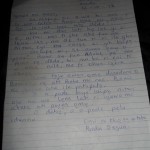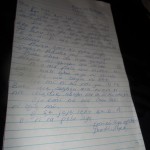Ni àtijọ́, àwọn ọmọ ilé-iwé ló ńran àgbàlagbà ti kò lọ ilé-iwé lọ́wọ́ lati kọ iwé, pataki ni èdè abínibí. Ẹ ṣe àyẹ̀wò àwọn iwé-àkọ-ránṣẹ́ wọnyi ni ojú iwé yi:
Ìwé ti Ìyá kọ sí ọmọ
Èsì iwé ti ọmọ kọ si iyá
Iwé ti ọkọ kọ si iyàwó
Èsi iwé ti aya kọ si ọkọ
![]()
![]()
![]()
![]()
ENGLISH TRANSLATION
In the olden days, school children often helped the elderly who were not literate to write letters particularly in the ethnic language. See samples of letters written in Yoruba below:
Letter from mother to child
20 Afunbiowo Street Akure
20 February, 1969
My dearest child,
Hope you are well as I am here? Your Father and your younger ones are fine. Hope your studies are going on fine?
My child “Akanki” do not forget your home. You will not disappear in your land of sojourn (Amen). Face your studies. You will bring in your harvest home.
Extend greetings to your friends. We shall be expecting your response.
May our meeting be as sweet as honey.
Yours truly, Your mother – Wale’s mother.
Child’s response to mother
Room 24 Fagunwa Hall University of Lagos Akoka, Lagos
March 13, 1969
My Dearest Mother,
How are you and my father? How is everyone at home?
I am very glad to inform you that I got to my School safely, my studies are going on fine. School is good, we are fed thrice daily, a big ocean is near our School. I met one our town’s man whose name is Kayode – from Aro’s family compound. He has helped me a lot to settle down in School.
I promise you and my father that I will not forget home.
Extend my special greetings to my younger ones ant to my brother Wale too. Also extend my greetings to my father and everyone at home.
We shall meet joyfully.
Yours truly, Your Son Ibukunolu
Husband’s letter to wife
12 Onabola Street Somolu, Lagos
12 October, 1978
My Dearest wife,
Hope you are well as I am here? How are my children? Hope their school is going on well?
I am glad to write you this letter, because I have been allocated an official car and I have secured an accommodation too. As a result, I will be sending for you all soon.
My love, hope the children are not stressing you? Tell Aduke that I love her dearly, if I see anyone coming home, I will send her toys.
Take care of the children very well. Extend my greetings to your mother and my father too. Greetings to everyone at home.
We shall meet joyfully very soon because I am eager to see my special wife and the children
Goodbye, we meet with happiness.
Your husband truly, Segun’s father
Wife’s response letter to husband in Yoruba
Ajamajebi’s ompound, Ilorin
16-11-78
My true husband,
I am glad to receive your letter. We are all fine. The children are doing well at School.
I am also glad to hear the joyful news that you have been allocated a car in your office and also that you have found an accommodation. By God’s grace, you will not record an accident with the vehicle.
The children are not giving me too much trouble but Aduke has been asking of her father always.
People at home are all fine.
We shall be getting ready because once the children begins their holiday we would love to join you in Lagos.
My mother sent her greetings. Father is a bit ill but he getting better little by little. Greetings from everyone at home.
I am eagerly looking forward to see my husband.
Do take care at work. We shall with joyfully.
Yours truly, Your wife Ibadi-ileke
Originally posted 2014-03-11 01:14:25. Republished by Blog Post Promoter
